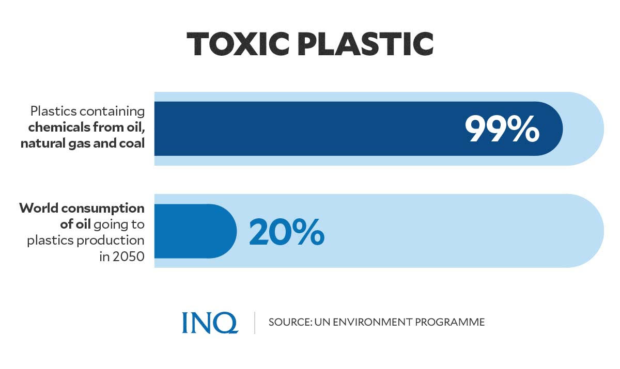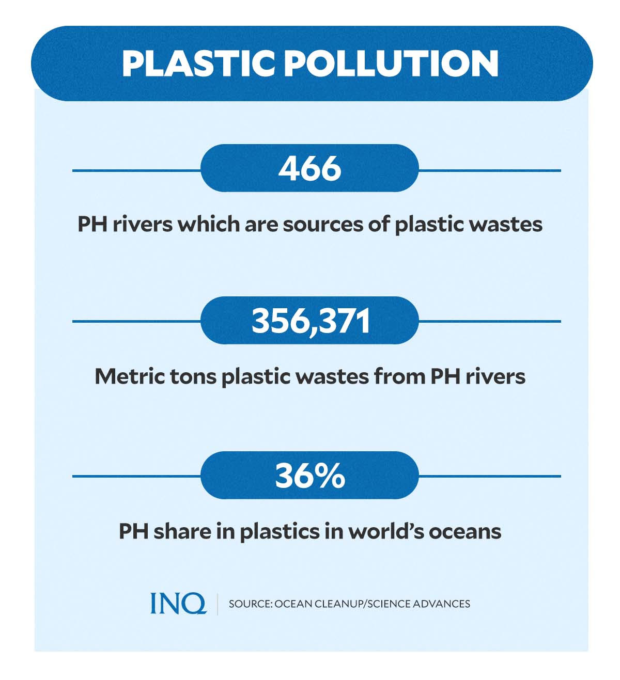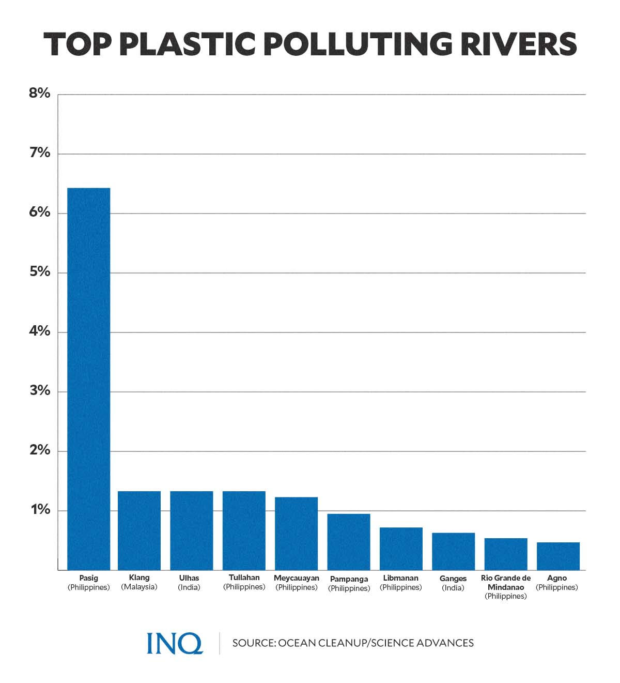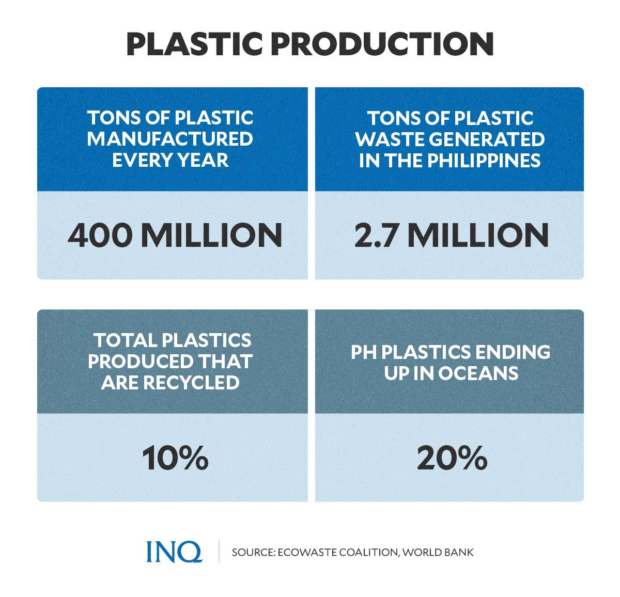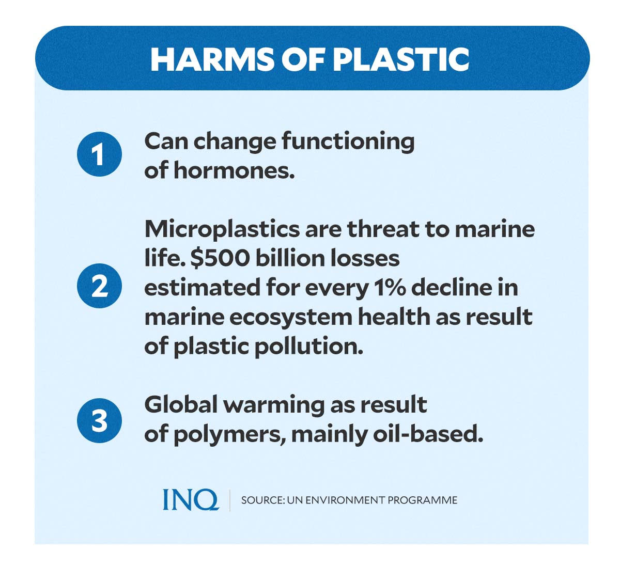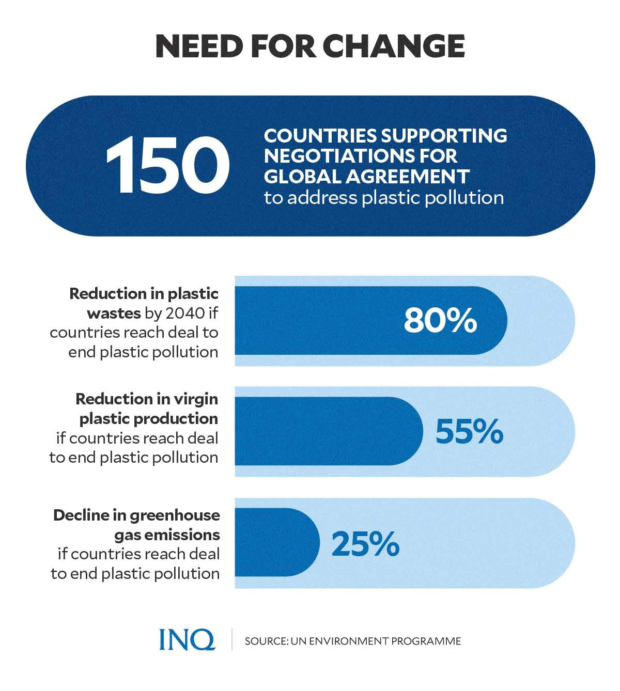There’s toxic plastic in your water: Groups see strong treaty as solution
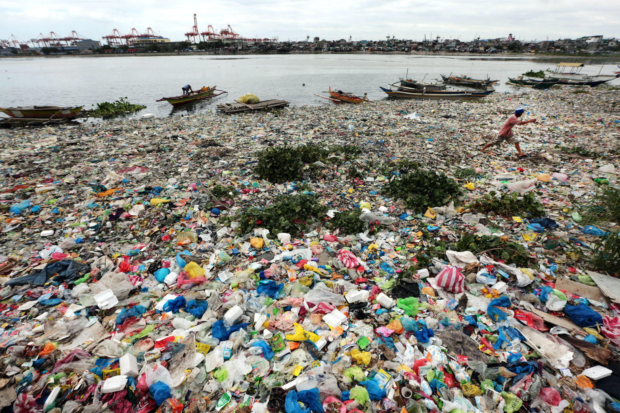
FILE PHOTO: MAJOR POLLUTER The 2021 Oxford University’s Our World in Data report says about 80 percent of global ocean plastic comes from Asian rivers, and the Philippines accounts for a third of that. Plastic waste literally covers some of our coastal areas as can be seen in this January 2019 photo off the shores of Baseco in Tondo, Manila. —GRIG C. MONTEGRANDE
MANILA, Philippines––There’s a need for a “strong plastics treaty” that will address and end the toxic threat and problems from plastic waste that are choking the world.
This was stressed by the EcoWaste Coalition as the second session of the 5th United Nations Environment Assembly (UNEA) resumed on Monday (Feb. 28) in Nairobi, Kenya.
The United Nations Environment Programme (UNEP) said the overall theme of the 5th UNEA is “Strengthening Actions for Nature to Achieve the Sustainable Development Goals.”
UNEP said it will create momentum for governments to work on environmental actions “to protect and restore the natural world on which our economies and societies depend.”
RELATED STORY: Toward a global treaty on plastic waste
This was the reason that the EcoWaste Coalition said delegates should take the chance to negotiate on a “strong legally binding” agreement that will “prevent, lessen and remediate” the problems brought by plastics.
Aileen Lucero, the group’s national coordinator, told UNEA––the world’s highest decision-making body for the environment––that “we want a strong plastics treaty to stop toxic pollution and environmental injustice.”
She said they link arms with the Break Free From Plastic, Global Alliance for Incinerator Alternatives, International Pollutants Elimination Network and all civil society groups in fighting for a strong plastics treaty.
Plastics crisis
Inger Andersen, executive director of UNEP, said while reducing plastic use seems like one of the easiest environmental actions that people can take, “it is not,” stressing that plastic pollution is the source of enormous harm to earth.
He said in a column that was first posted by The Times that there is no corner of the earth, from mountaintop to sea trench, without plastics. “We see it everywhere,” he said.
RELATED STORY: Online shopping rise brings phenomenal volume of plastic wastes
UNEP said that currently, the world produces 300 million tons of plastic waste yearly and that over 8.3 billion tons of plastic has been produced since the early 1950s––60 percent of this ending up in landfills or the natural environment.
From the 1950s to the 1970s, the world produced only a small volume of plastic, so the waste was “relatively manageable.” In the 1990s, however, plastic waste had more than tripled in just two decades.
UNEP said, in the early 2000s, the world’s plastic waste “rose more in a single decade than it had in the previous 40 years.” Since then, eight million tons of plastic waste end up in the oceans every year.
This, as the world produces 400 million tons of plastic yearly with only less than 10 percent recycled. The World Bank said every year, the Philippines generates 2.7 million tons of plastic waste.
READ: Only 9 percent of plastic recycled worldwide: OECD
Right now, UNEP said only nine percent of all plastic waste ever produced has been recycled, 12 percent has been incinerated, while the rest––79 percent––were thrown either into landfills or the natural environment.
PH polluted rivers
Last year, the Science Advances posted a peer-reviewed study by the Ocean Cleanup, an engineering environmental NGO that is based in the Netherlands.
It said rivers are a primary source of plastic waste in the oceans, stressing that 1,000 rivers are accountable for nearly 80 percent of the global yearly riverine plastic waste which range from 0.8 to 2.7 million metric tons every year.
The remaining 20 percent of plastic waste is distributed over 30,000 rivers. It said most plastic waste came from small rivers, contrary to earlier studies which stated that most plastic waste came from big rivers.
• 454 “very small” rivers contribute 25 percent of yearly plastic waste emissions
• 360 “small” rivers contribute 24 percent of yearly plastic waste emissions
• 162 “medium” rivers contribute 22 percent of yearly plastic waste emissions
• 18 “large” rivers contribute two percent of yearly plastic waste emissions
• Six “very large” rivers contribute one percent of yearly plastic waste emissions
• Rivers of varying sizes contribute 26 percent of yearly plastic waste emissions
The study said the Philippines contributed 36 percent of the plastic waste that ended up in oceans––466 of its rivers emitted 356,371 metric tons of mismanaged plastic waste yearly.
RELATED STORY: ‘Saving’ Manila Bay: Dolomite beach, wetlands drowning in wastes
It revealed that with 62,591 tons of plastic entering the oceans every year, the 27-kilometer Pasig River, which is located in Metro Manila, was considered as the most polluting river.
1. Pasig (Philippines): 6.43 percent
2. Klang (Malaysia): 1.33 percent
3. Ulhas (India): 1.33 percent
4. Tullahan (Philippines): 1.33 percent
5. Meycauayan (Philippines): 1.23 percent
6. Pampanga (Philippines): 0.95 percent
7. Libmanan (Philippines): 0.72 percent
8. Ganges (India): 0.63 percent
9. Rio Grande de Mindanao (Philippines): 0.54 percent
10. Agno (Philippines): 0.47 percent
However, the Department of Environment and Natural Resources contradicted findings that Pasig River is the “most polluting river,” saying that it was based on 2016 data and rehabilitation had started already in 2019.
The Climate Change Commission explained that coastal states, like the Philippines, have a relatively high probability of plastic entering the ocean because of these:
• Short distances from land-based sources to rivers
• Shorter distances to oceans
• Plastic flows more easily into rivers from paved developed districts than it does in rivers from forests
• It travels farther in rainy climates than dry ones
‘Not a simple problem’
The Ecowaste Coalition said plastic is not a simple litter problem––it’s a complex environmental, health, justice and climate issue, especially since 99 percent of plastic is derived from fossil fuels.
A coalition which fights for sustainable and right solutions to waste, climate change and chemical problems, Ecowaste said there’s a need to end the flow of plastics and their toxic chemicals.
UNEP said more than 99 percent of plastics are produced from chemicals derived from oil, natural gas and coal––all of which are dirty and non-renewable resources which could worsen global warming.
With this trend, the plastic industry could account for 20 percent of the world’s total oil consumption by 2050. “We need to slow the flow of plastic at its source […] we need to improve the way we manage our plastic waste,” UNEP said.
Andersen explained that chemicals in plastics can radically change the normal functioning of our hormones. Likewise, “microplastics are posing threats to coastal communities where marine species are the main food.”
UNEP said all over the world, one million plastic bottles are bought every minute while five trillion single-use plastic bags are used yearly––half of all plastic produced is designed for single use and then thrown away.
• Polyethylene terephthalate (PET)
• Water bottles, dispensing containers, biscuit trays
• High-density polyethylene (HDPE)
• Shampoo bottles, milk bottles, freezer bags, ice cream containers
• Low-density polyethylene (LDPE)
• Bags, trays, containers, food packaging film
• Polypropylene (PP)
• Potato chip bags, microwave dishes, ice cream tubs, bottle caps, single-use face masks
• Polystyrene (PS)
• Cutlery, plates, cups
• Expanded polystyrene (EPS)
• Protective packaging, hot drink cups
Since most of the plastic waste ends up in oceans, Andersen said a one percent decline in marine ecosystem services could cause an annual loss of $500 billion in global ecosystem benefits.
Conservation International said 17.6 billion pounds of plastic waste end up in the oceans every year, stressing that by 2050, ocean plastic will outweigh all of the ocean’s fish.
Based on data from the Sea Turtle Conservancy, plastic pollution kills one million marine animals every year––mammals, fish, sharks, turtles, and even birds––81 out of 123 marine mammals are known to have eaten or been entangled in plastic.
For EcoWaste, plastics which contain toxic chemicals and pose hazards to people’s health and the environment should not be produced and recycled.
What’s needed?
Andersen said states have a chance to make a new plastic-free economy a reality if they agree to start negotiations on a strong and comprehensive global agreement to tackle plastic pollution.
RELATED STORY: SC asked to compel gov’t action vs plastic pollution
“There is momentum,” he said. Since September 2021, over 150 countries have expressed an interest in negotiating a global agreement, while 74 leading businesses have asked to do it.
He said an agreement would have to be ambitious and have to fast-track action to address the impact of plastics, on land and at sea, across the entire lifecycle. “This would allow us to build on progress made so far, which is not insignificant,” he said.
“We need a system change that addresses the full life cycle of plastics, from the extraction of raw materials to alternatives to improved waste management,” he said.
Andersen stressed that “we need to be innovative and eliminate products that are unnecessary, avoidable or problematic, design products for reuse and recycling and ensure this happens, remove hazardous additives.”
“By doing this we could reduce the volume of plastics entering our oceans by over 80 per cent by 2040 and reduce virgin plastic production by 55 per cent. We could reduce greenhouse gas emissions by 25 per cent and create 700,000 additional jobs, mainly in the global south,” he said.
RELATED STORY: Senate OKs bill making firms responsible over plastic waste
TSB
